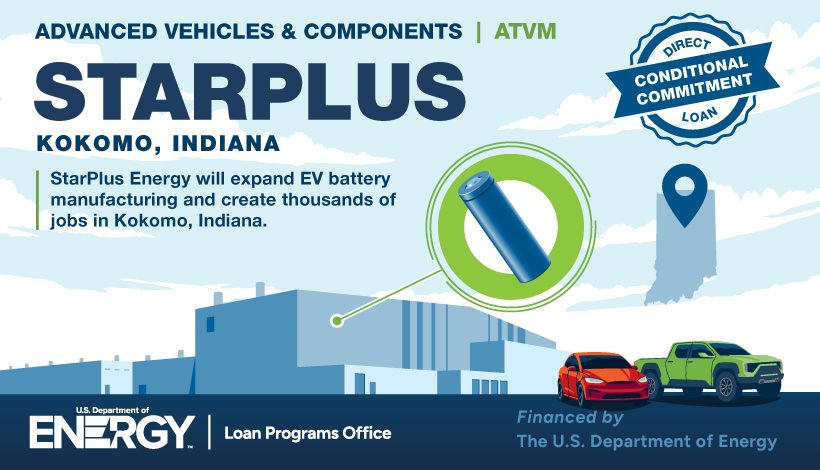
. If given the final go-ahead, the StarPlus Energy JV will use the financing for up to two lithium-ion battery cell and module manufacturing plants in Kokomo, Indiana. (Source: Shutterstock)
A joint venture (JV) between carmaker Stellantis and Samsung could get a more than $7.5-billion boost after the U.S. Department of Energy (DOE) said on Dec. 2 it plans to help finance the build-out of battery manufacturing facilities.
However, the conditional loan commitment—comprised of $6.85 billion in principal and $688 million in capitalized interest—must be finalized. If given the final go-ahead, the StarPlus Energy JV will use the financing for up to two lithium-ion battery cell and module manufacturing plants in Kokomo, Indiana.
The loan commitment was announced in the waning weeks of the Biden administration, which continues efforts to lower greenhouse gas emissions and to onshore and re-shore domestic manufacturing technologies. Lithium-ion batteries are essential in transitioning to lower-carbon energy, powering electric vehicles (EVs) and storing energy from renewables.
“DOE estimates the EVs produced using StarPlus batteries will displace the usage of 260.3 million gallons of petroleum per year—helping to slash harmful pollutants that jeopardize public health and pollute local ecosystems,” the LPO said in a news release. “The project will greatly expand EV battery manufacturing capacity in North America and reduce America’s reliance on adversarial foreign nations like China, as well as other foreign sourcing of EV batteries.”
The project is expected to produce about 67 gigawatt hours (GWh) of batteries, which the DOE’s Loan Programs Office (LPO) said is enough to supply about 670,000 vehicles annually when it reaches full capacity.

The JV has plans for two gigafactories in Kokomo. The first is expected to open in 2025 with an annual production capacity of 33 GWh. Production at the second gigafactory, announced in October 2023, is expected to begin in early 2027 with an annual capacity of 34 GWh.
The battery cells and modules produced at the new facilities will be sold to Stellantis for use in EV models that will be sold in North America. Stelllantis brands include Chrysler, Dodge, Fiat, Jeep, Maserati and Ram, among others.
To secure the loan, StarPlus must meet certain technical, legal, environmental and financial conditions. The company also must develop and implement a Community Benefits Plan, engaging with the community and labor stakeholders to create “good-paying jobs and improve the well-being of the local community and workers,” according to the LPO.
Stellantis has said the StarPlus project will create up to 2,800 new jobs at the plants.
The loan is being offered through the Advanced Technology Vehicles Manufacturing (ATVM) Loan Program. To date, the program has loaned about $8 billion for projects to support the production of over 4 million advanced technology vehicles, according to its website.
In late November, Rivian New Horizon received a conditional loan commitment from the LPO for up to $6.57 billion. The financing will go toward the development and construction of an EV manufacturing facility in Stanton Springs, Georgia. The company plans to manufacture new mid-size all-electric vehicles: an SUV called R2 and the R3/R3X crossover.
The Biden administration had set a target for 50% of all new vehicle sales to be electric by 2030 and rolled out regulations to help it get there. In March, the U.S. Environmental Protection Agency released strict car emissions standards for light-duty and medium-duty vehicles with model years 2027 and later. But the rule prompted opposition and litigation. The House voted in September to repeal the rule as some called it an “EV mandate.”
The platform of President-elect Donald Trump includes a promise to “cancel the electric vehicle mandate and cut costly and burdensome regulations.”
Recommended Reading
Phillips 66 Makes EPIC Move to Strengthen South Texas Position
2025-01-09 - Phillips 66’s $2.2 billion deal with EPIC allows for further integration of its South Texas NGL network.
AltaGas, Keyera Come to Mutual Agreements to Leverage Infrastructure
2025-02-07 - Canadian midstream companies AltaGas and Keyera have signed mutually beneficial, long-term contracts for NGLs and fractionation.
Renegade Waiting for ‘Catalyst’ as it Mulls Building, Buying Midstream
2025-02-06 - Renegade Infrastructure CEO Drew Ward says the company is currently “basin agnostic” and is considering greenfield projects and M&A after winning a capital commitment from PE firm Energy Spectrum Partners.
Targa Pipeline Helps Spark US NGL Production High in 2024
2025-01-23 - Analysts said Targa Resources’ Daytona line released a Permian Basin bottleneck as NGLs continued to grow.
Diversified Closes Summit Natural Resources Deal for $42MM
2025-02-27 - Diversified Energy Co. Plc closed its deal with Summit Natural Resources to buy operated natural gas assets and midstream infrastructure for approximately $42 million, the company said Feb. 27.
Comments
Add new comment
This conversation is moderated according to Hart Energy community rules. Please read the rules before joining the discussion. If you’re experiencing any technical problems, please contact our customer care team.






